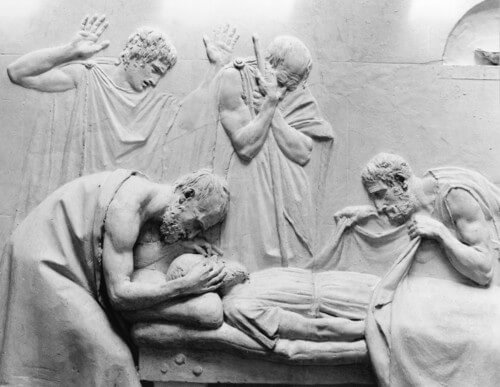The Soul and the Mind-building potentates, or on the irrationality of Artificial Intelligence

This is a follow-up article to the one published in VoegelinView on 20 September 2021. The question concerned whether a sudden emergency situation can lead to or bring about permanent changes in politics. Another question concerns the nature of the soul: is it possible to build it up artificially and to turn it into an automaton, as the expression artificial intelligence indicates? The soul is composed of incommensurable and commensurable elements; the latter die with its bearer, while the former survive its death; it is the mind itself, according to Plato and Aristotle. While both elements comprise the soul itself, the mind has a directing, dominating role over feeling, appetite and sensitivity, the main attributes of the commensurable part of the soul, as the Ancient Greeks thought: ‘that when a man is dead the soul still exists and has any power and intelligence [phronesis]’ (Plato, Phaedo 70b);, or, ‘this would be the process of generation from the dead to the living?’, (72a); ‘the return to life is an actual fact, and it is a fact that the living are generated from the dead and that the souls of the dead exist’; in the form of the remembering mind ‘our learning is nothing else than recollection’, (72e); so by this argument also it appears that the mind, the incommensurable part of the soul is immortal.
However, just as immortality means incommensurability, it also implies indivisibility and impassibility, so those who try to reconstruct the mind are only cloning its sensuality, or sensory impressions. They can clone the dynamic affinity movement between thinking and perception, so the incommensurable part of the soul is linked to the real by sight or touch or the other of the senses, which is the basis for perception. The mind is receiving sense perception by effluences and is responsible for sense perception. So far the incommensurability of the soul was concerned, but if the soul is moved, the most probable view is that what moves it are sensible things, which are commensurable in nature. Or, saying it differently, there is an immortal, invisible particle in our body, this is our soul that comprises the mind, which while moves itself, is moved by the commensurable, mortal sensibility to such an extent that the movement of the soul is a departure from its essential nature: the mind develops, the soul progresses during lifetime.
This is why the mind-building potentates in the process of thinking that goes through sensibility gained an enormous power in our times, when medium images are replacing reality. The desiring soul looks for impulses, it desires effects, to touch, to see, to build up experiences, to feel and to taste; by the senses it has the power of receiving into itself the sensible forms of things, without their material shell. Under normal circumstances this continuous displacement of every previous sensual movements has a serial unity (hence the state of being one; oneness), but not a spatial magnitude, nor a circular movement. Instead of that, the mind is forming or is arranged in a continuous unity of thinking, in a kind of linear transformation in which through every displacement or even in substitution it preserves its identity. The mind represents an identity element: its identity remains unchanged, even if it is combined with another element, but not in insinuation or the queasiness of artificiality. In the age of insinuation the serial unity of the mind becomes copied and altered into a feeling machine, a fake body identity, itself in a circulating movement of digesting sensuals and becoming a mortal machine which is fed by high and low sensuals, without inhibitions.
As we can see, for the Greeks the working of the soul is a process whereby emotions are passed on from one object to another and moved by different modes of sensual movements, in a kind of identity factorial mode that gets very large very quickly, as identity elements are always their own factorial. By a ‘sense’ is meant whatever has the power of receiving into itself the sensible forms of things, the phantom image, without the matter. Thinking is equal with perception, which moves the soul: every pain or pleasure, anger or joy makes our perception, and so thinking. These modes of movement are originating in the incommensurable mind.
For the cloned mind-potentates all this becomes subtly altered. Through cloning the sensuals are no longer affections of the mind (as it was considered for the Greeks), but become the affections of an artificial ‘mind’. The difference between them is that the artificial ‘mind’ is far away from anything rational (in the sense of ratio and utility being combined in charis), instead it is simply a build-up structure to receive and perceive sensuals, sensory impressions of appetite, pain or joy, etc. They build up a vanishing vehicle that continuously dies if it is not fed by sensuals. Death is foreseen for the commensurable, the feeling, touching, affective soul part (the vehicle), but not for the incommensurable mind, that survives in charis, which is originating its immortal movements.
The mind-building potentates rely on this knowledge in order to increase the mobility and so the capacity of the ‘mind’: it is necessary to increase the quantum of sensuals, painful or joyful, in every body which contain it, in order to raise energy and life force. While the soul is not a body, only kind of relative to it, it can be artificially constructed by phantasms, imaginations, which notoriously happen in the absence of senses – when faculty and activity is nullified, or when there is some failure of accuracy in the exercise of the senses, in any liminal moment like delirium, or in other mostly unreal moments of life – in order to animate an artificial structure, moved by appetite, sensuals and desire, named artificial intelligence, but in reality far away from the mindful performance of a living organism.
Consequently, by the time of disease prevention we are getting closer to the return of Nietzsche’ ‘monster of energy, without beginning, nor end, a firm, iron magnitude of force that does not grow bigger or smaller, that does not expend itself but only transforms itself’ (The Will to Power, 1067) by infinitely extracting sensuals from its delirious subjects in the mode of circular recurrence.




